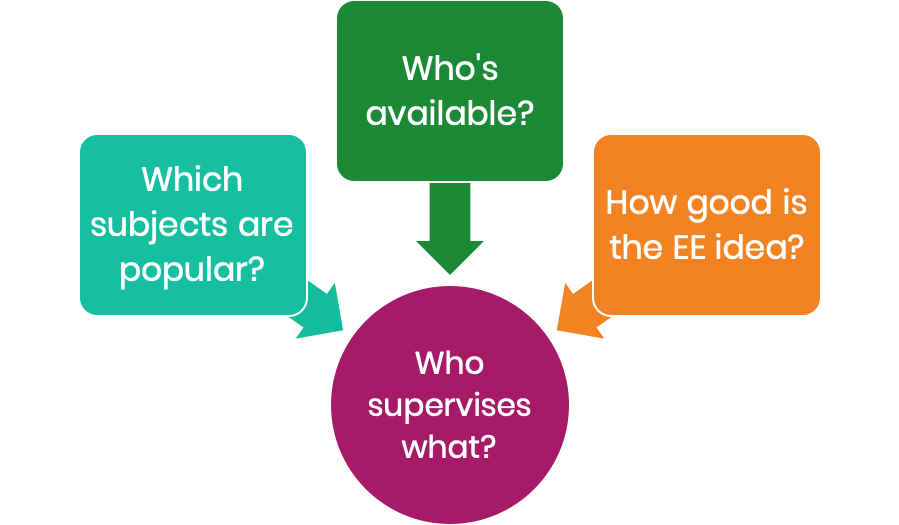Allocating supervisors
How are supervisors assigned or allocated to candidates? There are several methods, which EE coordinators should consider. The IB does not have any rules or regulations for the number of candidates a supervisor can supervise. However, among experienced IB schools, there seems to be an understanding that each teacher shouldn't supervise more than 4 essays per year. Schools should also consider how supervisors are compensated for supervising each essay through remuneration or release time. Some schools have timetable combined EE/CAS/TOK 'lessons' which are 'taught'. When allocating candidates to supervisors, keep in mind that some subjects, such as English A and History are more popular than other subjects, such as Maths and Physics. Besides teacher availability and subject popularity, the quality of students' EE proposals should also be considered. What if a candidate is passionate about a topic, and a teacher sees that their EE proposal has a lot of potential? Students' level of engagement and skill should also be considered when allocating supervisors. In brief, EE coordinators should consider these three factors and the methods described below. In the end, everyone should understand that students may not be able to work with their preferred supervisor.

The sign-up sheet
Some EE coordinators post a sign-up sheet on a notice board, where students can write their name and the name of the supervisor with whom they'd like to work. This 'free for all' is fine if there are few candidates and unlimited supervisors. What happens when everyone signs up for the same teacher/supervisor? This is not always clear. 'First come, first serve' is not always fair either.
The backroom deal
Many students often discuss EE ideas with their teachers after class, which is commendable. Teachers then consider both quality of the student's ideas and any other EE commitments, before confirming the allocation with the EE coordinator. Although this 'first come, first serve' method is not transparent, supervisors are involved in the decision-making process.
The EE market
Many schools have a limited number of supervisors per subject. For this reason, students are not always able to work with their preferred teacher/supervisor in their preferred subject. For this reason, schools sometimes challenge students to 'earn' their supervisor and subject, by asking students to submit an 'EE proposal'. Some schools even organise an 'EE market', in which students have to pitch several proposals to several teachers/supervisors to determine where students show potential or who will be allowed work on a popular subject or with a popular supervisor.